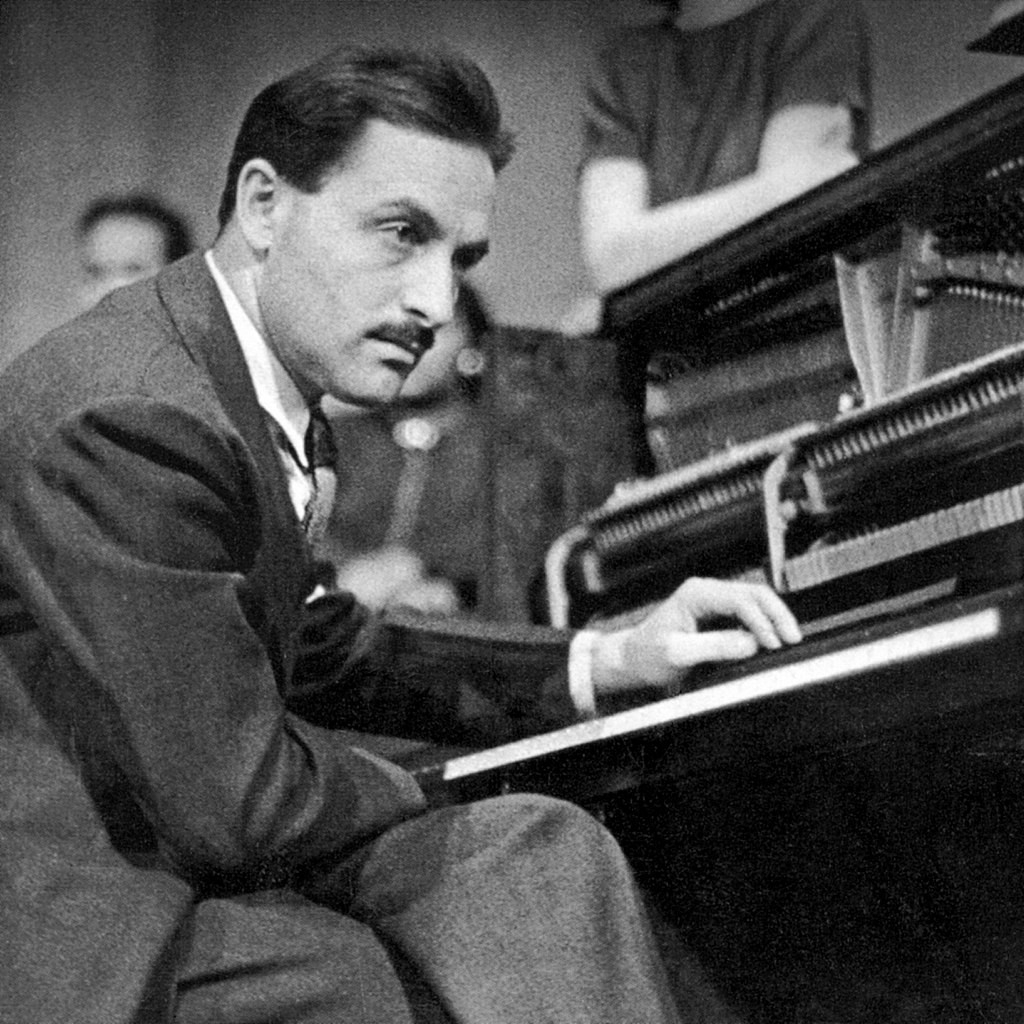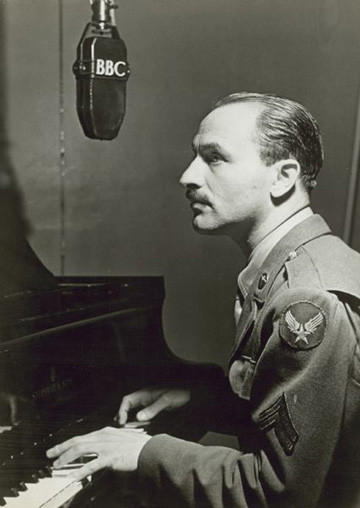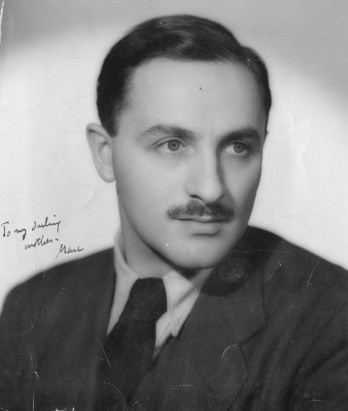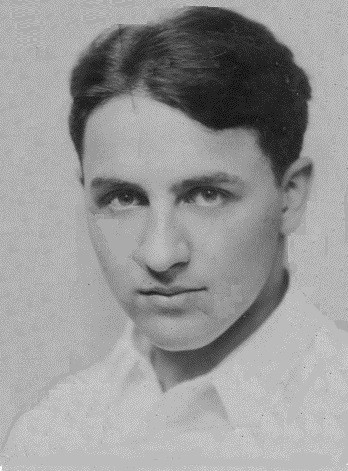Marc Blitzstein, Composer, 58
‘Threepenny Opera’ Adapter Wrote ‘Regina’—Had Been Prodigy on the Piano
Jan. 24, 1964
Marc Blitzstein, the operatic and theatrical composer, was killed in an automobile accident Wednesday night on Martinique in the West Indies. The former piano prodigy and adapter and translator of the “Threepenny Opera” was 58 years old.
Mr. Blitzstein, whose death was reported yesterday by members of his family, had been in Martinique since Nov. 1. He was there for swimming—his only hobby—and composing. He left several operas incomplete, including “Sacco and Vanzetti,” which was commissioned by the Metropolitan Opera.
Mr. Blitzstein was a slender, quiet man without the moody temperament associated with the artistic world. His only visible eccentricity was his mustache — which he would shave off impulsively, only to start growing it immediately again.
His career, however, had its days of conflict and controversy, beginning in 1937 when his pro‐labor operetta, “The Cradle Will Rock,” sponsored by the Federal Theater Project, was ordered off the stage by a Federal edict. The grounds for the order were that the Works Projects Administration was being reorganized and personnel was being cut.
The producers, Orson Welles and John Houseman, having already sold tickets and believing that they had a superb production, hired their own theater. The W.P.A. actors remained offstage, so that technically they were not violating an Actors Equity order against participating in an unauthorized presentation — and the show went on.
The actors spoke their lines and sang their parts from the floor and Mr. Blitzstein (not affected by anyone's edict) sat at the piano in the center of the stage, the spotlight picking him out against a blue backdrop, and played the entire score. It was an exciting, successful evening for all.
Mr. Blitzstein's next opera about the workers, “No for an Answer,” aroused opposition from New York's License Commissioner, who discovered that the Mecca Temple on West 55th Street did not have a theater license and that alleged building violations prevented issuing a permit.
The opera eventually did have its run in 1941, but some critics considered it to lack the wit and inspiration of “The Cradle Will Rock.” In the same year, Mr. Blitzstein wrote in a letter published in The New York Times:
“Musical snobbery is with us again. Just who decides, please, that Ravel's ‘Bolero’ is an ‘experience’ and may therefore join the anointed in Carnegie Hall, while Cole Porter's ‘Begin the Beguine’ must not crash the gate, being merely ‘entertainment? Which category contains Rossini? How about ‘Carmen’? Offenbach? The waltzes of Strauss? Negro spirituals? And should we take symphonic and operatic concerts off the air, since the radio is apparently the province of ‘entertainment’?
“This is a generalization based upon the old Puritan notion that if a piece is serious, it ought not give too much pleasure; and, per contra, if it does give pleasure, or even fun, it cannot be much good.”
Even though Mr. Blitzstein's opera based on the Sacco‐Vanzetti murder case of the nineteen‐twenties was never finished, its very possibility caused controversy in Louisville, Ky., in 1960. The directing board of the 600,000‐member National Federation of Music Clubs, meeting then in Louisville, adopted a resolution opposing the opera on the grounds that Mr. Blitzstein was an admitted member of the Communist party from 1938 to 1949.
The Metropolitan Opera's spokesman, Anthony A. Bliss, said in reply, “Since Mr. Blitzstein avows that he no longer maintains his past political affiliations, we do not feel that we should prejudge the work.”
Marc Blitzstein was born on March 2, 1905, the son of a south Philadelphia banker. Samuel M. Blitzstein, and Anna Levitt Blitzstein. The boy's mother was very fond of singing, and he was attracted to the family's living‐room piano shortly after he began to walk. At the age of 3 he was playing by ear works by Offenbach and Mendelssohn‐music his father whistled around the house.
Immediately, the family hired musical tutors, fearing that the boy might otherwise play only by ear. At 6. he made the first of many public appearances in Philadelphia.
After attending West Philadelphia High School, he went to the University of Pennsylvania from 1921 to 1923 on a scholarship. He then went to the Curtis Institute to study music and, in 1927, to the Akademie de Künst in Berlin.
In 1933. in Philadelphia, he married Miss Eva Goldbeck, a New York writer and daughter of Mrs. Edward Goldbeck, a singer known professionally as Lina Arabanell. They had no children. Mrs. Blitzstein died in 1936.
After Mr. Blitzstein's first public triumph in 1937 with “The Cradle Will Rock” and “No for an Answer”‐both were revived by the New York City Opera Company — he produced work regularly, and well.
There was “Regina,” an opera based on Lillian Hellman's “The Little Foxes,” and his other operas and musicals included “Triple‐Sec.” “The Harpies,” “The Condemned,” “Parabola and Circula.” “Reuben, Reuben” and “Juno.” In “Juno,” Mr. Blitzstein's song ?We're Alive” was said to epitomize the terrible strength and fury of Sean O'Casey's “Juno and the Paycock,” on which the musical was based.
Mr. Blitzstein's most popular contribution to the musical stage, however, was his translation from the German of Kurt Weill's and Bertolt Brecht's “Threepenny Opera.”
His symphonies, “The Airborne” and “Freedom Morning,” were performed by his friend, Leonard Bernstein and the New York City Symphony and the Philadelphia Orchestra. He also wrote incidental music for stage productions such as “Julius Caesar,” “Danton,” “The True Glory” and “Native Land.”
Leonard Bernstein said on hearing of the composer's death: “Mr. Blitzstein was so close a personal friend that I cannot even begin to measure our loss of him as a composer. I can think only that I have lost a part of me; but I know also that music has lost an invaluable servant. His special position in musical theater is irreplaceable.”
“Mr. Blizstein received two Guggenheim fellowships and was a member of the National Institute of Arts and Letters, whose composition prize he won in 1946.
Mr. Blitzstein served in the Army in World War II.
He is survived by his mother in Philadelphia, who is 81 years old, and a sister, Mrs. Edward Davis.
ADVERTISEMENT
BY
Looking for more information?

 Amanda S. Stevenson
Amanda S. Stevenson 
 Amanda S. Stevenson
Amanda S. Stevenson 
 Amanda S. Stevenson
Amanda S. Stevenson 
 Amanda S. Stevenson
Amanda S. Stevenson 